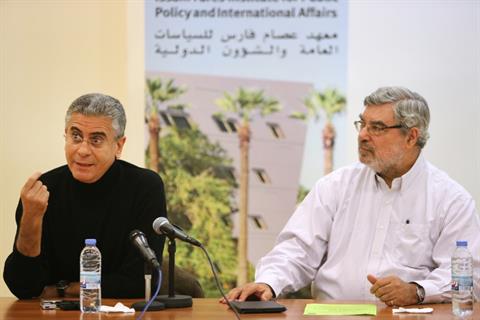A World Bank official said that Lebanon’s thriving banking sector was sparing the country from further economic deterioration.
World Bank director for the Middle East and North Africa, Farid Belhaj, left, and Director of IFI, Rami Khoury speak during a conference at AUB in Beirut
“Lebanon has a very thriving financial sector and a diaspora contributing to the rise of deposits in Lebanese banks in addition to a private sector working quite effectively,” Ferid Belhaj, Middle East director at the World Bank, told The Daily Star on the sidelines of a lecture at the American University of Beirut. “This is helping the economy to a great extent.”
Despite the fall in capital inflows and a drop of foreign direct investment, Lebanese expatriates are still sending billions of dollars to their families and the banks each year.
But Belhaj warned of dire consequences from the excessive flow of Syrian refugees to Lebanon for the country’s economy if the crisis persisted.
“The country already has enough economic problems, not to have to deal with that dimension as well,” he said.
A recent World Bank report on the effects of the Syrian crisis on Lebanon estimated the cost of the war and the presence of refugees at $7.5 billion.
It said that the total cost to the Lebanese Treasury was $5.1 billion, of which $1.1 billion was in direct current budgetary outlays associated with service provision to refugees (such as medical care in public hospitals, public schooling for children, electricity and other subsidies.)
The World Bank also said that Lebanon needed $2.5 billion in additional capital investment to maintain access to, and the quality of, services (such as number of hours of electricity supply a day) at their 2011, pre crisis levels for 4 million resident nationals and 1.2 million refugees.
However, Belhaj said that despite the huge flow of Syrian refugees Lebanon was showing resilience.
“However, I am not sure for how long the country will be able to bear such a burden,” he added.
“Before I came here, some colleagues told me that Lebanon is defying gravity,” he said, warning that the country might not be able to maintain its resilience for too long especially with the absence of a government.
“The more you go in this kind of institutional stalemate, the huge flow of refugees and the absence of a proper budget, the more you would be running risks,” he said.
Belhaj highlighted the importance of ending the institutional stalemate in Lebanon in order to facilitate the implementation of World Bank projects.
“We have a number of projects on education, health, small and medium enterprises, innovations in the telecoms sector, in addition to poverty reduction plans, but some of them are waiting for the Parliament to ratify them,” he said. “This is a big issue.”
In his speech during a session about lessons learned from Arab uprisings organized by Issam Fares Institute for Public Policy and International Affairs at the American University of Beirut, Belhaj gave a brief overview of the reasons behind the Arab Spring uprisings and the role of the World Bank in dealing with their economic repercussions.
He said that the main reason behind Arab revolutions was the neglect of the middle class in the countries.
“The middle class in these countries was neglected, and we were witnessing a lot of odd ways in dealing with the economies and societies of these countries,” he said.
He believes that what drove Arab leaders out of power was not the revolution of the people but the lack of support from the middle class that had been a pillar of these regimes.
Belhaj explained that Arab leaders had become very removed from the real problems facing their countries while, on the other hand, the West continually found excuses to keep supporting these regimes.
“In particular, these leaders did not realize statistics on paper did not necessarily reflect reality on the ground.”
Belhaj admitted that the World Bank did not make a proper assessment about the real economic situation in these countries. “We did not see the reality through those numbers,” he said.
“In all the countries where the turmoil started, we saw what the government, economists and technicians were saying, but we did not see what was happening on the ground.”
Belhaj said the World Bank responded to Tunisia’s uprising by providing the government with $500 million to help the country stabilize itself.
“We tried to do the same with Egypt, but it did not work, although we had the intention,” he said.




